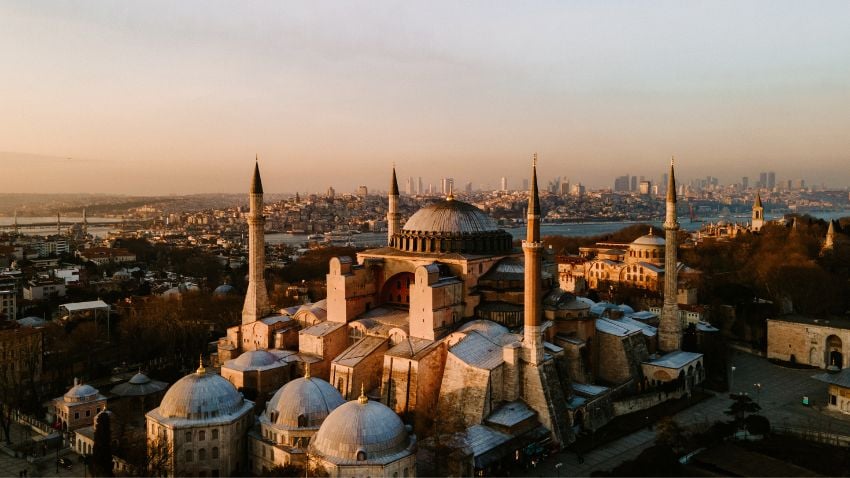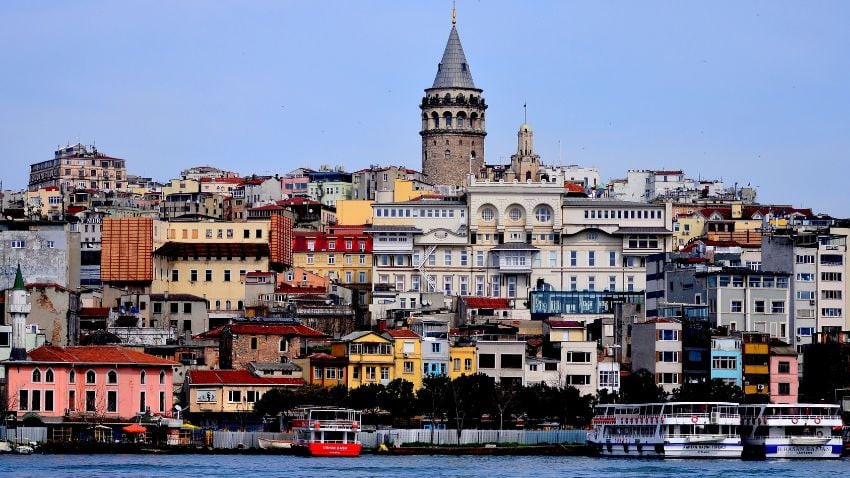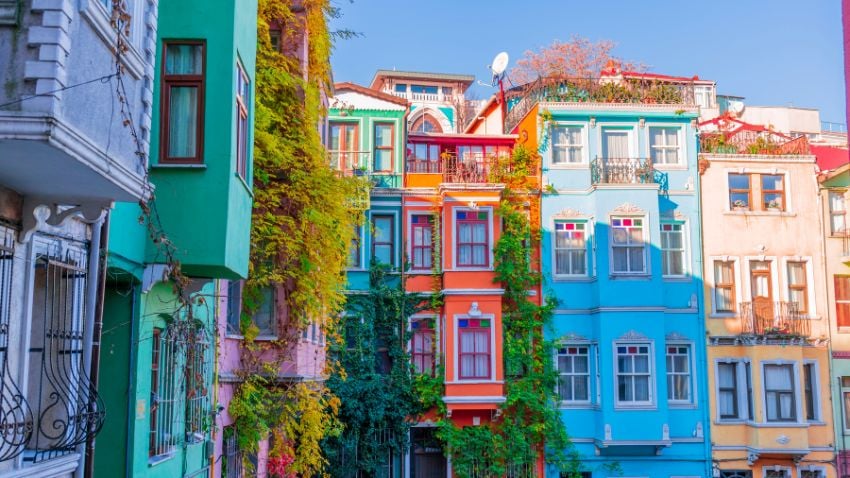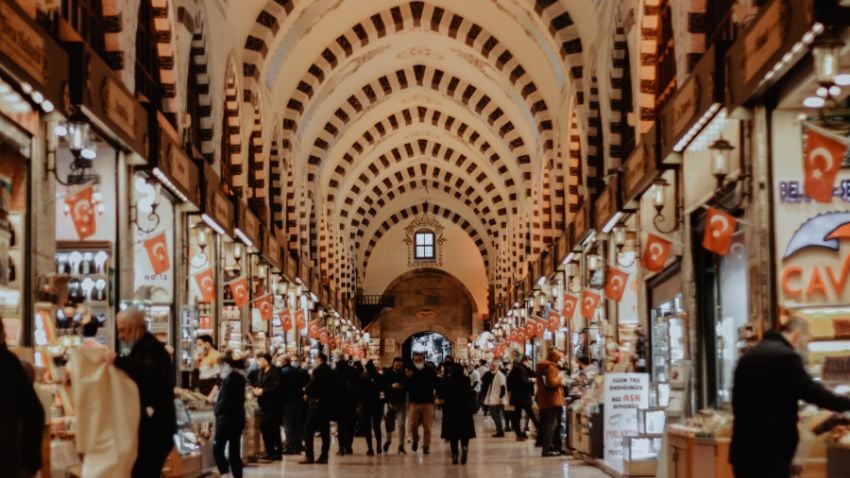How Safe Is Costa Rica?
Costa Rica has become one of the most popular expat and digital nomad destinations in Latin America, known for its natural beauty, relaxed lifestyle,...

9 min read
Turkey is an exciting country to live in. With a rich cultural heritage, a booming economy, and a strategic location at the nexus of Europe and Asia, it has everything that an expat might need. Amazingly, Turkey also grants residency to any foreign property owner. Today, we’re going to give you a breakdown of everything you need to know.
Turkey's Residency By Investment program offers a compelling option for individuals and families seeking a fresh start in this culturally rich and diverse country. This initiative encompasses various types of residency permits, including the coveted family residence permit, which allows the primary applicant, their spouse, and children to establish residency in Turkey. This flexibility accommodates a wide range of applicants, making it particularly appealing to families in search of protection, educational opportunities, and an enriched lifestyle.
The duration of a family residence permit in Turkey typically spans one year, with the possibility of renewal as long as the conditions for the permit continue to be met. This means that families can enjoy a secure and stable environment while exploring all that Turkey has to offer, from its historical sites to its stunning natural landscapes.
One of the significant advantages of Turkey's program is the inclusion of the applicant's immediate family members. This inclusive approach ensures that the entire family unit can benefit from the opportunity to live, study, and work in Turkey, fostering strong family bonds and shared experiences.

In addition to buying property in Turkey, it is also possible to acquire investment residence when doing business there
Not to be confused with Turkey’s Citizenship by Investment program, Turkey also offers residency to anyone who purchases real estate there. Acquiring property in Turkey opens the door to residency. This comes in the form of a short-term renewable residency permit, which essentially just allows you to live in Turkey. As an aside, if you are considering investing in Turkish real estate, there is a tool you can use that will give you some details about any registered property. It won’t give you personal information about the owner, but it can at least let you know about the status of the property in question.
There are a few restrictions on what type of property a foreigner can buy to qualify for residency. You cannot purchase land which is within a prohibited military zone. This is mostly in border areas, such as along the Turkey-Syria border - not exactly prime real estate unless you like having jihadists as your neighbours. Alternatively, you can purchase real estate anywhere that private property is allowed, so long as total foreign ownership does not constitute more than 10% of the district. There is also a further limit on the total size of a lot that a foreigner can own. That limit is 30 hectares. If you want to buy an estate larger than that, you will need special dispensation from the Cabinet of Ministers.
To qualify for a family residence permit in Turkey, applicants are required to provide proof of financial resources to support their family's living expenses, including housing, food, and education. This financial protection ensures that families have the means to thrive and enjoy a comfortable life in Turkey.
Aside from purchasing property, one can also acquire residency by investment by conducting business there. This includes simply networking and searching for business contacts as well as establishing a physical business or branch of a firm in Turkey. Ensure you have all the necessary documents ready to support your application, including proof of your investment and personal identification.

If you are interested in staying in Turkey for more than a few months, you will need a residence permit
As previously mentioned, foreign investors who purchase real estate in Turkey automatically qualify for a short-term residence permit. This permit is valid for two years. However, in the case of exceptionally large investments (along the lines that would qualify for citizenship by investment), a residency permit of five years may be obtained.
Family residence permits allow the applicant and their family to reside in Turkey for a maximum duration of five years. After this period, applicants can explore the option of applying for a long-term residence permit, providing a path to continued residency in this welcoming country.
A residency permit is required if you desire to stay in Turkey for more than a few months. Otherwise, you could just get a tourist visa or take advantage of visa-exempt status or visa on arrival if you are from one of the 100+ countries that have that status in Turkey. Note that Americans and Canadians, while not technically visa exempt, can qualify for visa-on-arrival services at select international airports. Alternatively, you can get an e-visa which is a relatively painless process. To apply for the Short-Term Residence Permit, you can do it on the official website.
The process for applying for a short-term residency permit as an investor involves the following:
Four photos;
Completed application form;
Demonstration of economic means (bank account, for example);
Real estate title, if applicable;
Health insurance coverage;
Notarized documents about your business, if applicable.
Foreigners who intend to apply for a short residence permit by investing in amounts and scopes attested by the Council of Ministers must meet other criteria.

If you spend more than 8 years in the country, you can apply for long-term residence
Your passport is a fundamental document for the application. A valid visa is also crucial for your initial entry into the country. Ensure that both documents have sufficient validity to cover the duration of your intended stay. The foreigner is required to fulfill the conditions stipulated in Article 32 of Law No. 6458 to have a short-term residence permit:
Accuracy and completeness are key to a successful application process. Note that if you spent more than 8 years in Turkey, you’ll be able to apply for Long-Term Residence.

Close attention to what can cause cancellation, refusal or non-renewal of the short-term residence permit
Under the following cases, a short-term residence permit shall not be granted, shall be cancelled if it has been issued, and shall not be renewed when:

By residing in Turkey legally with a short-term residence permit you can qualify for citizenship after 5 years
Probably the number one advantage of utilizing your status as an investor or business person is that there is no minimum investment required to qualify. All you need to do is purchase any property, and voila, by law, you become a Turkish resident. And there is a lot of great value in Turkish real estate, whether you are looking for a luxury villa by the sea or a nice condo in an upscale district of Istanbul.
In fact, you don’t even have to purchase real estate if you can simply establish that you are making business connections in Turkey. You will have to demonstrate that you have sufficient means to sustain yourself and your family while you are living in Turkey, but even there, the bar is set pretty low.
Turkey boasts a high-quality education system, with a wide array of educational institutions, including international and private schools. Students can access various resources to support their education and choose from diverse academic programs, including university-level courses. This makes Turkey an attractive destination for families with children seeking top-notch educational opportunities.
Another significant advantage of establishing residency in Turkey in this manner is that it is an excellent pathway to citizenship. Simply by residing in Turkey legally under renewable short-term residence permits, you can qualify for citizenship after five years. In order to get that coveted second passport (ranked around 50th in the world in terms of visa-free access to other countries), you will also need to learn Turkish and have good morals.
Turkey is home to several prestigious universities, offering a diverse range of academic programs. With a family residence permit, students have the opportunity to pursue higher education in this dynamic environment, including the chance to sit for university entrance exams and access various university resources.
In addition to its educational offerings, Turkey's rich culinary heritage provides families with a delightful array of food options, catering to diverse tastes. Families can savor the vibrant lifestyle and cultural experiences that Turkey has to offer while living in this hospitable and welcoming country.
Despite Istanbul being ranked as the “least liveable city in Europe” by The Economist’s Intelligence Unit, Turkey has consistently ranked as a top expat destination. Between the low cost of living, great climate, and fascinating culture, there are many reasons to make the move.
Relevant article: The Basics Of How To Get A Second Passport Or A Second Residency

According to the government of Turkey you must live in the country for more than six months in a calendar year to become a tax resident
Residents of Turkey are taxed on any income that they have worldwide, whereas non-residents only have to pay income tax that is sourced from within the country. The Turkish personal income tax starts off at 15% with a basic exemption of ₺70,000 (around $2.992 USD) and has a top marginal rate of 40%.
According to the Turkey Government, to become a tax resident in Turkey, you must live in the country for more than six months in one calendar year. However, if you stay in the country for six months or more for employment, study, business or medical treatment, you are considered a tax non-resident. You are also treated as a tax non-resident if you are a scientist, specialist, official, press and information correspondent, or if you are detained or stay in Turkey for reasons beyond your control, such as detention, conviction, or illness.
There is also a valued added tax with a general rate of 18%, although some goods are taxed at a reduced rate. Property taxes are 0.3% for the land and 0.1% or 0.2% for the buildings depending on if they are residential or not, respectively. These taxes get doubled in major urban areas. There is also a special luxury real estate tax levied on high-valued estates worth more than ₺9,967,000 ($422,928 USD). The amount of this tax ranges between 0.3% to 1%, depending on how much the estate is valued.

Due to its excellent geographic location and its young demographics with a growing population, investing can be a good idea
The Turkish economy does have some strong fundamentals. Despite being plagued by high inflation, Turkey enjoys low government debt levels and strong economic growth. With a population of 85 million, the Turkish economy is ranked the 19th largest in the world by nominal GDP and the 11th using PPP.
Other positive factors for investing in Turkey are its growing population, youthful demographics, and excellent geographical location. Turkey also benefits from its large informal economy, which is estimated to employ as many as 75% of the workers in rural areas. This underground economy allows smaller businesses to escape the regulatory burdens and taxes imposed by the Turkish state.
This large shadow economy has also facilitated the employment of large numbers of Syrian refugees who have been unable to find employment in the formal labour market. Turkey now hosts approximately 2/3rds of the Syrian refugees who fled the recent Syrian civil war.
Investing in Turkish residency comes with a multitude of benefits. Enjoy the advantage of living in a country known for its rich history, vibrant culture, and stunning landscapes. Access to excellent healthcare, education, and a strategic location for travel are additional perks that attract people from around the world.
Turkey actively welcomes foreign applicants seeking residency through investment. Stay informed about the latest regulations and updates regarding the residency program.
Turkey Residency By Investment offers a pathway for foreigners to not only invest but also establish a fulfilling life in this captivating country. Understanding the intricacies of the process and embracing the benefits will undoubtedly make your journey towards Turkish residency a rewarding one.
Once your residency is granted, you have the freedom to travel within Turkey without the need for additional visas. Explore the country at your leisure and make the most of your newfound home.

In addition to high unemployment and inflation, Turkey suffers from a lot of bureaucracy and an inconsistent judicial system
While the right to own property is enshrined within the Turkish constitution, and the government has worked to encourage foreign direct investment, investors face some issues regarding participating in the Turkish economy. Aside from high unemployment and inflation, Turkey also suffers from excessive bureaucracy and an inconsistent judicial system. In the wake of the failed 2016 coup, the Turkish government confiscated $32.24 billion USD worth of assets without compensation from anyone “linked” to the attempted revolution.
The Turkish population is also overtly hostile to the idea of foreign ownership of homes. With 79% of respondents in a poll in favour of banning foreign home ownership and a populist authoritarian government at the helm, anything can happen. This hostility can partly be explained by the housing crisis faced by many Turkish families, fueled by runaway inflation and a steady decrease in demand. Rental prices are up anywhere from 100% to 200% across Instanbul, Akara, and Izmir.

Turkey can be a great place to live, although it has problems, the advantages are great, especially for expats
Establishing Turkish residency by investment is a viable strategy, whether you are looking to live there for just a few years or if you want to settle there permanently and become a citizen. Compared to many other countries, establishing residency through investment is a relatively painless and low-investment effort.
Turkey can be a great place to live. While it is not without its problems, there are also a lot of advantages, especially for expats. While high inflation is a huge problem for people earning in Lira, it can also mean great prices for those whose assets are denominated in foreign currency.
Turkey's Residency By Investment program offers families a pathway to a new and exciting life in a country renowned for its historical significance, natural beauty, and economic opportunities. With family inclusion, educational prospects, and financial protection, it presents a compelling choice for those seeking to make Turkey their new home.
If you want the best intel from the expat world, including profitable offshore opportunities, little-known tax-saving strategies, and hard-won insights on immigration, passports, and Plan-B residencies, all delivered to your inbox every single week, then join our daily correspondence, EMS Pulse®. Currently enjoyed by over 84,000 expats and expat-hopefuls worldwide. Fill in the form below to join our newsletter free:

Written by Mikkel Thorup
Mikkel Thorup is the world’s most sought-after expat consultant. He focuses on helping high-net-worth private clients to legally mitigate tax liabilities, obtain a second residency and citizenship, and assemble a portfolio of foreign investments including international real estate, timber plantations, agricultural land and other hard-money tangible assets. Mikkel is the Founder and CEO at Expat Money®, a private consulting firm started in 2017. He hosts the popular weekly podcast, the Expat Money Show, and wrote the definitive #1-Best Selling book Expat Secrets - How To Pay Zero Taxes, Live Overseas And Make Giant Piles Of Money, and his second book: Expats Guide On Moving To Mexico.

Costa Rica has become one of the most popular expat and digital nomad destinations in Latin America, known for its natural beauty, relaxed lifestyle,...

Mexico remains one of Latin America’s most compelling destinations, especially for North Americans. More than a million expats call it home, and tens...

South Korea is far more than K-pop and K-dramas. It is a country known for outstanding food, from bustling street markets to high-end dining, as well...